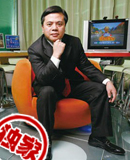09年12月英语六级模拟试卷及解析之六(文都)(6)
Part Ⅲ Listening Comprehension(听力原文在光盘中)
Tape Script of Listening Comprehension
Section A
Directions: In this section, you will hear 8 short conversations and 2 long conversations. At the end of each conversation, one or more questions will be asked about what was said. Both the conversation and the questions will be spoken only once. After each question there will be a pause. During the pause, you must read the four choices marked A), B), C) and D), and decide which is the best answer. Then mark the corresponding letter on Answer Sheet 2 with a single line through the center。
11. M: Now, what seems to be the trouble, Mrs. Stephens?
W: I've been very dizzy lately, and last night I had some chest pain。
Q: What's the probable relationship between the two speakers?
12. W: Was Robert elected to the committee?
M: Yes, in fact he was made chairman but he only agreed to take the job if they'll let him make all the decision himself。
Q: What does Robert intend to do?
13. W: Have Chris and Sally left for school yet? It's a quarter to nine now。
M: Sally left at 8:15 a.m., and Chris hurried off twenty minutes later。
Q: What time did Chris leave home?
14. M: Frank is always complaining about his job。
W: Maybe if you tried waiting on tables, you'd see what it's like。
Q: What does the woman mean?
15. M: I'd love to dance, but I don't know the steps。
W: It doesn't matter. No one will be looking at us in this crowd。
Q: What does the woman mean?
16. W: We’d better get moving if we don’t want to be late。
M: Take it easy. It’s three o’clock now。
Q: What does the man mean?
17. W: Jerry, can you pick me up after work today? I left my car at the garage。
M: I’m afraid I can’t. I’ve scheduled an appointment with a client at dinner time。
Q: What is the man going to do?
18. W: I couldn’t have won the award without your assistance. Thank you very much。
M: You have been working so hard. You deserve the honor。
Q: What do we learn from the conversation?
Now you’ll hear two long conversations。
Conversation One
W: Hi, Jack, I heard that you were studying law in Britain. Can you tell me how the classes are arranged there?
M: Sure. Basically, our classes are made up of two major parts: lectures and seminars. The lectures are just like the general classes in China。
W: You mean, teachers give presentations, and students listen?
M: Yeah. But the students are freer to ask questions. The classroom atmosphere is warmer too。
W: Ok. How about the seminars?
M: In the seminars, students are encouraged to do some case study. In the case study, students are encouraged to share their views with the classmates. Students need to make full preparation. They need not only to study relevant laws, but also to read relevant cases to benefit the class。
W: But what do professors do in the seminar?
M: Professors are only organizers of it. They don’t express their ideas。
W: Does everyone have a chance to express his idea in the seminar?
M: Yes, since our class is very small. Generally, there are only 8 to 10 students in one class。
W: Oh, that is a very small class. How about the lecture? How many students are there in one class?
M: The lecture class is much bigger. Sometimes, there can be more than one hundred of us in one class。
W: I see。
Questions 19 to 22 are based on the conversation you have just heard。
19. What’s true about the lecture class?
20. What’s true about the seminar class?
21. In which way is the lecture in Britain different from that in China?
22. What’s the size of the seminar class?
Conversation Two
W: Richard, what's that under your paper?
M: What's what?
W: Lift up your arm. What's this?
M: Oh, that. Uh, that's a grocery list. I've got to pick up some things on my way home。
W: Do you really expect me to believe that?
M: Well, that's what it is。
W: (reading) Soren Kierkegaard, Denmark, 1800s, Hegel, Germany, Sartre, Paris, 1900s... An interesting "grocery" list, Mr. Jackson。
M: Oh, gee, let me see that. Oh, my gosh, they must be my notes. How did they get here?
W: I'd like to see you in my office, please. (They leave the classroom and go to the office down the hall。) Now, Richard, would you care to explain how the answers to the test questions appeared on your desk?
M: I can't. Someone must have left them on my desk。
W: Someone left them on your desk? Someone with handwriting identical to yours left them on your desk? I'm afraid I can't accept that answer。
M: Are you accusing me of cheating?
W: Yes, I am。
M: You can't do that without proof! I'm going to call my counselor!
W: By all means, do that. In the meantime, however, don't come to class again. I am extremely disappointed in your behavior。
Questions 23 to 25 are based on the conversation you have just heard。
23. What's the relationship between these two speakers?
24. What does the woman mean when she says "an interesting 'grocery' list"?
25. What makes the woman believe that it is the man who wrote the list?
Section B
Directions: In this section, you will hear 3 short passages. At the end of each passage, you will hear some questions. Both the passage and the questions will be spoken only once. After you hear a question, you must choose the best answer from the four choices marked A), B), C) and D). Then mark the corresponding letter on Answer Sheet 2 with a single line through the center。
Passage One
It was 1951, during my first week at North Carolina College, a black school. The English chairman's wife, who was as light as a white woman, stopped me one day in the hall。
When I went to her office, she said, "You had the highest grade on the examination." She was talking about the exam that the entire freshman class took. In spite of her smile, her eyes and tone of voice said, "How could this black-skinned girl score higher on the test than the other students? It must be a mistake." At North Carolina College, color was used in deciding status. The faculty assumed that light-skinned students were more intelligent, and they were always a bit surprised when a dark-skinned student did well, especially if she was a girl。
When the grades for the first quarter came out, I had the highest average in the freshmen class. The chairman's wife called me into her office again, pulled out a copy of the freshman English final exam, and asked me to retake it. I couldn't believe it. It was so incredible to her that I had the highest score in the class that she was trying to test me again. I felt rage so intense that I wanted to start hitting her. I have seldom hated anyone so deeply. I handed the exam back to her and walked out。
Questions 26 to 28 are based on the passage you have just heard。
26. How did the chairman's wife feel about the highest grade the student got in her freshman exam?
27. What was the student asked to do after the grades for the first quarter came out?
28. Why did the chairman's wife treat the student that way?
Passage Two
At sixteen Henry Vincent was separated from his family as a result of the war. He wandered aimlessly from one country to another before finally settling down in Australia, where he trained as an electronics engineer. He established his own business but it called for so much work that marriage was out of the question。
His retirement suddenly made him realize how lonely he was and he decided to take up a hobby. With his interest in electronics, being an amateur radio operator seemed a natural choice. He installed his own equipment and obtained a license and his call sign, which is the set of letters and numbers used to identify oneself when making radio amateur operators all over the world。
Soon Henry had a great many contacts in far off places. One in particular was a man in California with whom he had much in common. One night the man in California happened to mention the village in Europe he had come from. Suddenly, Henry realized that this man was in fact his younger brother, Peter. At first, the two brothers were at a loss for words but then little by little they filled in the details of their past lives and not long after Henry Vincent flew to California to be reunited with his brother。
Questions 29 to 31 are based on the passage you have just heard。
29. What kind of training did Henry get when he was in Australia?
30. What hobby did Henry take up after his retirement?
31. Who is the person Henry had much in common with?
Passage Three
Laid-off workers are still the focus of China's unemployment problem。
Wang Yadong, a senior official at the Ministry of Labor and Social Security said the year will conclude the government's three-year policy of actively promoting employment. The plan was adopted in 2002 to provide subsidies and job opportunities for laid-off workers. He said that a system of unemployment insurance will take its place。
By the end of last year, there were 1.53 million laid-off workers from state-owned companies nationwide, with 930,000 currently registered in re-employment service centers。
Ministry spokesman Hu Xiaoyi said officials will expand the unemployment insurance system this year to employees of non-state-owned enterprises. So far, a dozen provinces - mostly in the east and the north - have established such systems, while western areas will catch up gradually。
Meanwhile, the number of jobless young people is on the rise. Statistics show young people make up an increasing part of the unemployed, 0.7 percent more than that from the same period over last year。
Analysts say the upward expansion in college enrolment in recent years is much to blame since it has ignored unbalanced industrial development and has failed to match market demands。
The undesirable employment situation can also be found in some poor areas, several industries and some special groups, including the disabled。
The ministry said it will produce a new package of measures to solve employment problems among laid-off workers, college students and the rural labor force during the next year。
Questions 32 to 35 are based on the passage you have just heard。
32. What kind of method will take place to promote employment for laid-off workers?
33. How many laid-off workers have NOT registered in reemployment service center?
34. Which areas will catch up gradually to establish unemployment insurance system?
35. Why is the number of jobless young people on the rise?
Section C
Directions: In this section, you will hear a passage three times. When the passage is read for the first time, you should listen carefully for its general idea. When the passage is read for the second time, you are required to fill in the blanks numbered from 36 to 43 with the exact words you have just heard. For blanks numbered from 44 to 46 you are required to fill in the missing information. For these blanks, you can either use the exact words you have just heard or write down the main points in your own words. Finally, when the passage is read for the third time, you should check what you have written。
Unemployment is a deeply sensitive political issue for Chancellor Gerhard Schroeder. Back in 1998 he was elected for his first term on a promise that the jobless count would be brought down to three and half million。
He failed on that and now the official unemployment figure is above five million, the first time since the great depression of the 1930s, which brought the Nazis to power. And to make matters worse, the official figures may greatly understate the real extent of the problem. Once those on government training schemes and the like are included, the actual number of people looking for work could be as high as nine million。
The German economy has yet to fully recover from the boom and bust that followed reunification a decade ago. German firms with their high wage and social costs have struggled in an increasingly globalized world economy, where work has shifted to new manufacturing centers such as China。
But, despite the latest unemployment figures, there are some recent signs of economic improvement in what is still by far Europe’s largest economy. Consumers are spending more in the shops, a sign they're more confident about the future. Meanwhile businesses are more optimistic than they were a couple of years ago. Welfare benefits have been reduced. Companies have been re-organized to cut costs。
It's been a painful process but economists say it's beginning to produce results. The German economy is growing again, though slowly, and is seen as one of the more robust in the European Union。
特别说明:由于各方面情况的不断调整与变化,新浪网所提供的所有考试信息仅供参考,敬请考生以权威部门公布的正式信息为准。






